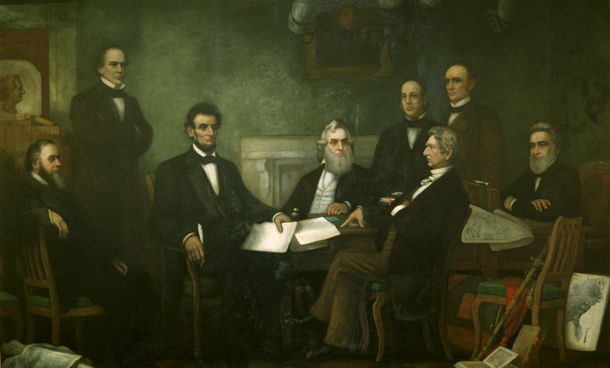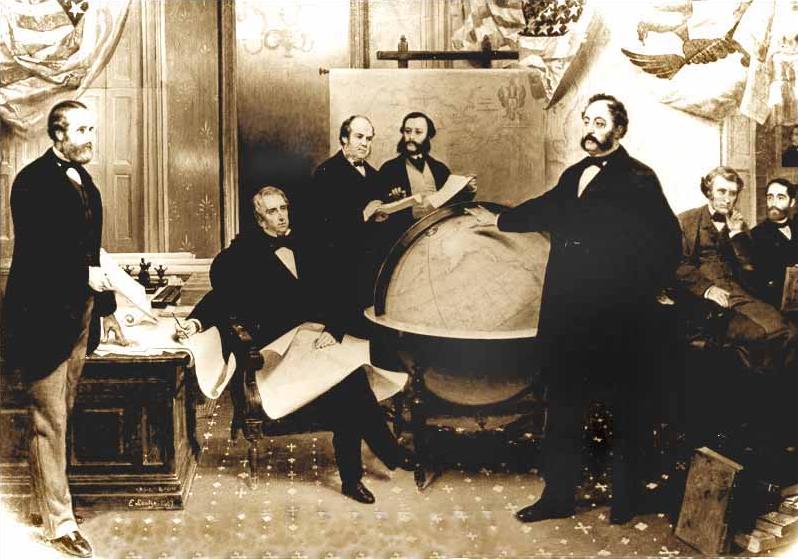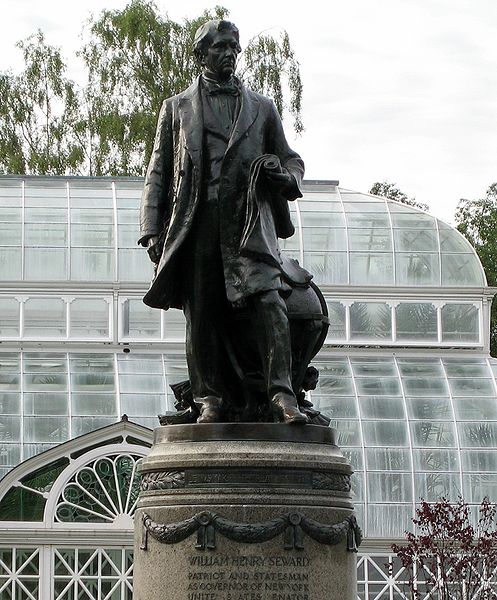<Back to Index>
- Mathematician Pafnuty Lvovich Chebyshev, 1821
- Architect Petrus Josephus Hubertus Cuypers, 1827
- United States Secretary of State William Henry Seward, Sr., 1801
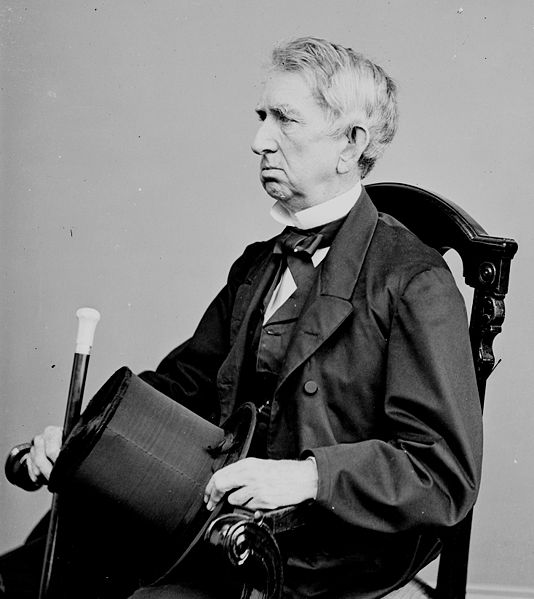
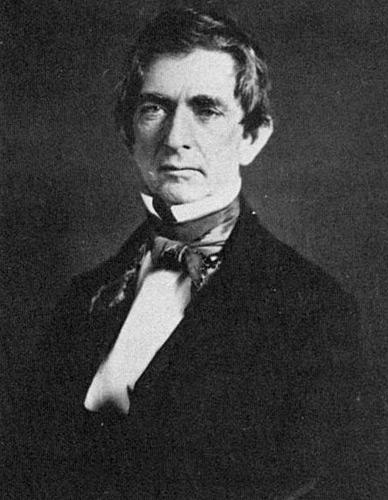
William Henry Seward, Sr. (May 16, 1801 – October 10, 1872) was the 12th Governor of New York, United States Senator and the United States Secretary of State under Abraham Lincoln and Andrew Johnson. An outspoken opponent of the spread of slavery in the years leading up to the American Civil War, he was a dominant figure in the Republican party in its formative years, and was widely regarded as the leading contender for the party's presidential nomination in 1860 – yet his very outspokenness may have cost him the nomination. Despite his loss, he became a loyal member of Lincoln's wartime cabinet, and played a role in preventing foreign intervention early in the war. On the night of Lincoln's assassination, he survived an attempt on his life in the conspirators' effort to decapitate the Union government. As Johnson's Secretary of State, he engineered the purchase of Alaska from Russia in an act that was ridiculed at the time as "Seward's Folly," but which exemplified his character.
Seward was born in Florida, Orange County, New York, on May 16, 1801, one of five children of Samuel Sweezy Seward and his wife Mary Jennings Seward. Samuel Seward, described as "a prosperous, domineering doctor and businessman," was the founder of the S. S. Seward Institute, today a secondary school in the Florida Union Free School District. Seward served as president of the S.S.Seward Institute after the death of his father, even while serving as Secretary of State during the Lincoln and Johnson administrations.
Seward studied law at Union College, graduating in 1820 with highest honors, and as a member of Phi Beta Kappa. He was admitted to the New York State Bar in 1821. In that same year, he met Frances Adeline Miller, a classmate of his sister Cornelia at Emma Willard's Troy Female Seminary and the daughter of Judge Elijah Miller of Auburn, New York. In 1823, he moved to Auburn where he entered into law partnership with Judge Miller, and married Frances Miller on October 20, 1824. They raised five children. Some years after his wife's death in 1865, Seward formally adopted his companion Olive Risley Seward (1841-1908) as his "daughter."
Seward entered politics with the help of his friend Thurlow Weed, whom he had met by chance after a stagecoach accident. In 1830, Seward was elected to the state senate as an Anti-Masonic candidate, and served for four years. In 1834, the 33-year-old Seward was named the Whig party candidate for Governor of New York, but lost to incumbent Democrat William Marcy who won 52% of the vote to Seward's 48%. From 1836 to 1838, Seward served as agent for the Holland Land Company in Westfield, New York,
where he was successful in easing tensions between the company and
local landowners. On July 16, 1837, he delivered to the students and
faculty of the newly-formed Westfield Academy a Discourse on Education, in which he advocated for universal education. In
1838, Seward again challenged Marcy, and was elected Governor of New
York by a majority of 51.4% to Marcy's 48.6%. He was narrowly
re-elected to a second two-year term in 1840. As a state senator and
governor, Seward promoted progressive political policies including
prison reform and increased spending on education. He supported state
funding for schools for immigrants operated by their own clergy and
taught in their native language. This support, which included Catholic parochial schools, came back to haunt him in the 1850s, when anti-Catholic feelings were high, especially among ex-Whigs in the Republican Party. Beginning
in the late 1830s, Seward became a radical opponent of slavery. His
views – and the even stronger anti-slavery feelings of his
wife – were formed in part by their observations of the conditions
of slavery while traveling in the South with their children in 1835. He
opposed the expansion of slavery and resisted attempts by Southern
states to extradite those who enabled fugitive slaves to escape. In
1846 Seward became the center of controversy in his hometown when he
defended, in separate cases, two convicts accused of murder. Henry
Wyatt, a white man, was charged in the stabbing death of a fellow
prison inmate; William Freeman, of African American and Native American ancestry,
was accused of breaking into a home and stabbing four people to death.
In both cases the defendants were mentally ill and had been severely
abused while in prison. Seward, having long been an advocate of prison
reform and better treatment for the insane, sought to prevent both men
from being executed by using a relatively new defense of insanity. In a
case involving mental illness with heavy racial overtones Seward
argued, "The color of the prisoner’s skin, and the form of his
features, are not impressed upon the spiritual immortal mind which
works beneath. In spite of human pride, he is still your brother, and
mine, in form and color accepted and approved by his Father, and yours,
and mine, and bears equally with us the proudest inheritance of our
race—the image of our Maker. Hold him then to be a Man." Later,
Seward quoted Freeman’s brother-in-law, praising his eloquence: “They
have made William Freeman what he is, a brute beast; they don’t make
anything else of any of our people but brute beasts; but when we
violate their laws, then they want to punish us as if we were men.” In
the end both men were convicted. Although Wyatt was executed, Freeman,
whose conviction was reversed on Seward's successful appeal to the New York Supreme Court, died in his cell of tuberculosis. Seward supported the Whig candidate, General Zachary Taylor,
in the presidential election of 1848. He said of Taylor, "He is the
most gentle-looking and amiable of men." Taylor was a slave holding
plantation owner, but was friendly to Seward anyway. William Seward was elected a U.S. Senator from New York as a Whig in 1849, and emerged as the leader of the anti-slavery "Conscience Whigs". Seward opposed the Compromise of 1850,
and was thought to have encouraged Taylor in his supposed opposition.
More recent scholarship suggests that Taylor was not under Seward's
influence and would have accepted the Compromise if he had not died. Seward
believed that slavery was morally wrong, and said so many times,
outraging Southerners. He acknowledged that slavery was legal under the Constitution,
but denied that the Constitution recognized or protected slavery. He
famously remarked in 1850 that "there is a higher law than the
Constitution". He continued to argue this point of view over the next
ten years. He presented himself as the leading enemy of the Slave Power –
that is, the perceived conspiracy of southern slave owners to seize the
government and defeat the progress of liberty. Seward was an opponent
of the Fugitive Slave Act, and he defended runaway slaves in court. He supported personal liberty laws. In February 1855, he was re-elected as a Whig to the U.S. Senate, and joined the Republican Party when the New York Whigs merged with the Anti-Nebraskans later the same year. Seward did not seriously compete for the presidential nomination (won by John C. Frémont)
in 1856, but sought and was expected to receive the nomination in 1860.
In October 1858, he delivered a famous speech in which he argued that
the political and economic systems of North and South were
incompatible, and that, due to this "irrepressible conflict," the
inevitable "collision" of the two systems would eventually result in
the nation becoming "either entirely a slaveholding nation, or entirely
a free-labor nation.". Yet,
Seward was not an abolitionist. Like Lincoln, he believed slavery could
and should be extinguished by long-run historical forces rather than by
coercion or war.
In 1859, confident of gaining the presidential nomination and advised by his political ally and friend Thurlow Weed that
he would be better off avoiding political gatherings where his words
might be misinterpreted by one faction or another, Seward left the
country for an eight-month tour of Europe. During that hiatus, his
lesser-known rival Abraham Lincoln worked diligently to line up support
in case Seward failed to win on the first ballot. After returning to
the United States, Seward gave a conciliatory, pro-Union Senate speech
that reassured moderates but alienated some radical Republicans.
(Observing events from Europe, Karl Marx, who was ideologically sympathetic to Frémont, contemptuously regarded Seward as a "Republican Richelieu" and the "Demosthenes of the Republican Party" who had sabotaged Frémont's presidential ambitions.) Around the same time, his friend Horace Greeley turned
against him, opposing Seward on the grounds that his radical reputation
made him unelectable. When Lincoln won the nomination, Seward loyally
supported him and made a long speaking tour of the West in the autumn
of 1860.
Abraham
Lincoln appointed him Secretary of State in 1861 and he served until
1869. As Secretary of State, he argued that the United States must move
westward. Proposing American possession of the Danish West Indies, Samaná, Panama, and Hawaii, only the Brook Islands were
annexed. Despite a minimal degree of Congressional support however, by
the end of his term, Seward had established a realm of informal
influence which, nonetheless included the Hawaiian Islands, Japan, and even, China. Seward also played an integral role in resolving the Trent Affair, and in negotiating the Lyons-Seward Treaty of 1862, which set forth aggressive measures by which the United States and Great Britain agreed to end the Atlantic slave trade.
On April 14, 1865, Lewis Powell, an associate of John Wilkes Booth, attempted to assassinate Seward, the same night that Abraham Lincoln was
shot. Powell gained access to Seward's home by telling a servant,
William Bell, that he was delivering medicine for Seward, who was
recovering from a recent near-fatal carriage accident on April 5, 1865.
Powell started up the stairs when then confronted by one of Seward's
sons, Frederick.
He told the intruder that his father was asleep and Powell began to
start down the stairs, but suddenly swung around and pointed a gun at
Frederick's head. After the gun misfired, Powell panicked, then
repeatedly struck Frederick over the head with the pistol, leaving
Frederick in critical condition on the floor. Powell then burst into William Seward's bedroom with a bowie knife and
stabbed him several times in the face and neck. Powell also attacked
and injured another son (Augustus), a soldier (SGT George Robinson) who
had been assigned to stay with Seward, and a messenger (Emerick
Hansell) who arrived just as Powell was escaping. During
the attack Seward was wearing a jaw splint (often incorrectly reported
as a "neck brace") as a result of the carriage accident, and it is said
that this saved his life. However, he carried the facial scars from the
attack for the remainder of his life. The events of that night took
their toll on his wife, Frances, who died June 1865. His daughter Fanny
died of tuberculosis in October 1866. Powell was captured the next day and was executed on July 7, 1865, along with David Herold, George Atzerodt, and Mary Surratt, three other conspirators in the Lincoln assassination.
Although
it took Seward several months to recover from his wounds, he emerged as
a major force in the administration of the new president, Andrew
Johnson, frequently defending his more moderate reconciliation policies
towards the South, to the point of enraging Radical Republicans who
once regarded Seward as their friend but now attacked him. In
the fall of 1866, Seward joined Johnson, as well as Ulysses S. Grant
and the young General George Armstrong Custer, along with several other
administration figures, on the president's ill-fated "Swing Around the
Circle" campaign trip. At
one point Seward became so ill on the trip, probably from cholera, that
he was sent back to Washington in a special car. Both Johnson and
Grant, as well as several members of the Seward family, thought the
Secretary was near death. But as with his April 1865 stabbing,
Seward surprised many by his rapid recovery.
Seward's most famous achievement as Secretary of State was his successful acquisition of
Alaska from Russia. On March 30, 1867, he completed negotiations for
the territory, which involved the purchase of 586,412 square miles
(1,518,800 km²) of territory (more than twice the size of Texas) for $7,200,000, or approximately 2 cents per acre (equivalent to US$95 million in 2005). The purchase of this frontier land was alternately mocked by the public as "Seward's Folly," "Seward's Icebox," and Andrew Johnson's "polar bear garden." Alaska celebrates the purchase on Seward's Day, the last Monday of March.
Seward retired as Secretary of State after Ulysses S. Grant took
office as president. During his last years, Seward traveled and wrote
prolifically. Most notably, he traveled around the world in fourteen
months and two days from July, 1869, to September, 1871. On October 10,
1872, Seward died in his office in his home in Auburn, New York, after having difficulty breathing. His last words were to his children saying, "Love one another." He was buried in Fort Hill Cemetery in Auburn, New York, with his wife and two children, Cornelia and Fanny. His headstone reads, “He was faithful.” His son, Frederick, edited and published his memoirs in three volumes.
